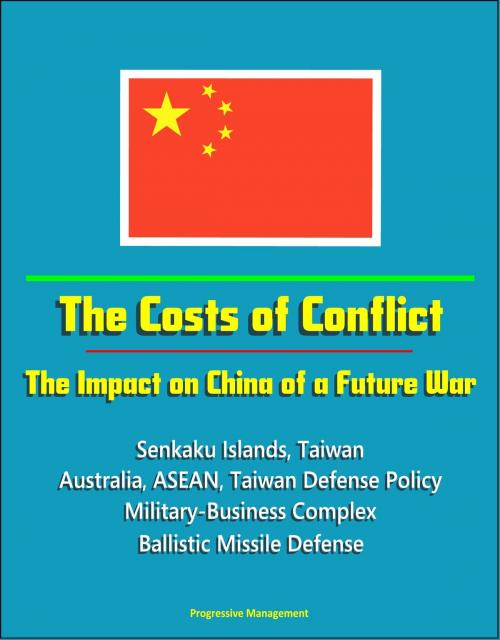The Costs of Conflict: The Impact on China of a Future War - Senkaku Islands, Taiwan, Australia, ASEAN, Taiwan Defense Policy, Military-Business Complex, Ballistic Missile Defense
Nonfiction, History, Asian, China| Author: | Progressive Management | ISBN: | 9781311392435 |
| Publisher: | Progressive Management | Publication: | March 20, 2014 |
| Imprint: | Smashwords Edition | Language: | English |
| Author: | Progressive Management |
| ISBN: | 9781311392435 |
| Publisher: | Progressive Management |
| Publication: | March 20, 2014 |
| Imprint: | Smashwords Edition |
| Language: | English |
There is a need for the United States to move the debate over the challenge China presents us beyond the dispositions of the attention grabbing advocates: the rationalizers who explain Chinese actions in benign terms with their own political or academic motives, or the denigrators, who are "The Chinese Are Coming" school—to wit: China is belligerent, a threat, in short, a monster. It is increasingly important for Americans to think carefully about the vast complexities of the U.S.-China relationship, and the calculations that go into forming courses of action. The Chinese have to consider some of the same realities we do when planning military actions and strategy. The key question is: will China's so-called first priority of economic development and its resulting influence on domestic social stability curtail China's continuing reliance on military force as a means of exerting its influence? In addition, will economic development enhance China's comprehensive national power and thus contribute to some of China's more unhealthy goals, such as dominating the South China Seas, seizing Taiwan by force, or grabbing the Senkaku Islands from Japan? Is the China-Taiwan economic dynamic strong enough to offset military adventurism? The rationalizers often say security and sovereignty will always trump economic determinism, others insist economic factors will change China—and thus decrease the chances of war. How this dilemma is managed by the United States, China, and Taiwan will affect the future of Asia, and perhaps the world. We have tried to present in this book factual and analytical essays which stress the need for squarely addressing these questions.
Contents: Chinese Perceptions of the Costs of a Conflict * Conflicting Tendencies: Economic Integration Versus Political Impasse * Taiwan Dependence: The Strategic Dimension of Cross-Strait Trade and Investment * The Costs of China's Military Conflict: The Korean and Japanese Dimensions * The Impact of a Conflict on China's Relations with Southeast Asia and Australia * Taiwan and the Chinese Military * Homeland Defense with Taiwanese Characteristics: President Chen Shui-bian's New Defense Concept * The Arms Control and Ballistic Missile Defense Costs of a Chinese Conflict * "Eating Imperial Grain"?: The Ongoing Divestiture of the Chinese Military-Business Complex, 1998-2000.
In addition, this unique collection of American military documents provides a special view of recent Chinese military and policy developments. Contents: China Shaping the Operational Environment - A Disciple on the Path of Deception and Influence * The "People" in the PLA: Recruitment, Training, and Education in China's 80-Year-Old Military * China's Maritime Quest * The PLA At Home and Abroad: Assessing The Operational Capabilities of China's Military * Arms Sales To Taiwan: Enjoy The Business While It Lasts * China's Role In The Stabilization Of Afghanistan * The Coming of Chinese Hawks * Turkey and China: Unlikely Strategic Partners. This ebook also includes the annual U.S. intelligence community worldwide threat assessment in Congressional testimony by Director of National Intelligence James R. Clapper Jr.
There is a need for the United States to move the debate over the challenge China presents us beyond the dispositions of the attention grabbing advocates: the rationalizers who explain Chinese actions in benign terms with their own political or academic motives, or the denigrators, who are "The Chinese Are Coming" school—to wit: China is belligerent, a threat, in short, a monster. It is increasingly important for Americans to think carefully about the vast complexities of the U.S.-China relationship, and the calculations that go into forming courses of action. The Chinese have to consider some of the same realities we do when planning military actions and strategy. The key question is: will China's so-called first priority of economic development and its resulting influence on domestic social stability curtail China's continuing reliance on military force as a means of exerting its influence? In addition, will economic development enhance China's comprehensive national power and thus contribute to some of China's more unhealthy goals, such as dominating the South China Seas, seizing Taiwan by force, or grabbing the Senkaku Islands from Japan? Is the China-Taiwan economic dynamic strong enough to offset military adventurism? The rationalizers often say security and sovereignty will always trump economic determinism, others insist economic factors will change China—and thus decrease the chances of war. How this dilemma is managed by the United States, China, and Taiwan will affect the future of Asia, and perhaps the world. We have tried to present in this book factual and analytical essays which stress the need for squarely addressing these questions.
Contents: Chinese Perceptions of the Costs of a Conflict * Conflicting Tendencies: Economic Integration Versus Political Impasse * Taiwan Dependence: The Strategic Dimension of Cross-Strait Trade and Investment * The Costs of China's Military Conflict: The Korean and Japanese Dimensions * The Impact of a Conflict on China's Relations with Southeast Asia and Australia * Taiwan and the Chinese Military * Homeland Defense with Taiwanese Characteristics: President Chen Shui-bian's New Defense Concept * The Arms Control and Ballistic Missile Defense Costs of a Chinese Conflict * "Eating Imperial Grain"?: The Ongoing Divestiture of the Chinese Military-Business Complex, 1998-2000.
In addition, this unique collection of American military documents provides a special view of recent Chinese military and policy developments. Contents: China Shaping the Operational Environment - A Disciple on the Path of Deception and Influence * The "People" in the PLA: Recruitment, Training, and Education in China's 80-Year-Old Military * China's Maritime Quest * The PLA At Home and Abroad: Assessing The Operational Capabilities of China's Military * Arms Sales To Taiwan: Enjoy The Business While It Lasts * China's Role In The Stabilization Of Afghanistan * The Coming of Chinese Hawks * Turkey and China: Unlikely Strategic Partners. This ebook also includes the annual U.S. intelligence community worldwide threat assessment in Congressional testimony by Director of National Intelligence James R. Clapper Jr.















